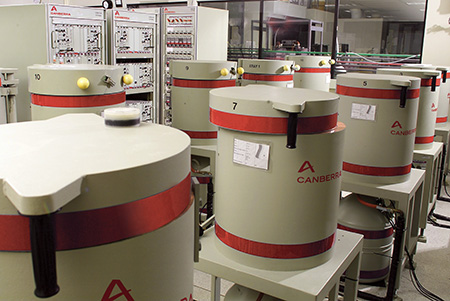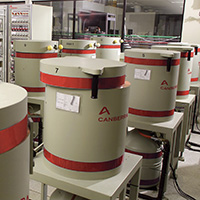 Dr Andrew Boston: “CANBERRA is the leader in this market, so combining expertise in this way benefits both parties enormously”
Dr Andrew Boston: “CANBERRA is the leader in this market, so combining expertise in this way benefits both parties enormously”
New radiation detectors with state-of-the-art data analysis are being developed in a partnership between the University of Liverpool and a leading manufacturer in order to deliver measurement improvements for nuclear safety and security.
The work between the University’s Nuclear Physics Group and CANBERRA will create detection systems which are more sensitive than those currently available, significantly reducing the measurement time required to count radioactive samples.
Environmental studies
This could be applied in environmental studies like those performed at sites such as Fukushima where there may be low, but dangerous levels of contamination in water supplies.
Dr Andrew Boston from the Nuclear Physics Group said: “Partnerships with industry are an important way of delivering some of the ground-breaking research in physics to real situations.
“CANBERRA is the leader in this market, so combining expertise in this way benefits both parties enormously.”
Using a prototype manufactured by CANBERRA, physicists at the University will create new algorithms to reduce the time required to take these samples and increase sensitivity. The new models will be designed to reduce the need for corrections having to be made and increase the accuracy of the radiation count.
These improvements will deliver benefits for work in the field, as very low levels of radiation at accident or disposal sites can still be dangerous.
More rigorous
Reducing the time it takes to count samples will help security services who are checking for banned materials – for example at airports, or for inspectors enforcing international treaties. In civil nuclear work, greater sensitivity will mean that safety checks at power stations can be even more rigorous than they already are.
The research is being funded with a £500,000 grant from the Science and Technology Facilities Council and will take three years to complete.
Dr James Cocks, Vice-President for Research and Development at CANBERRA said: “The University of Liverpool is recognised as a world leader in detector research and has access to great facilities, so we are moving in a common direction which will deliver enormous benefits to both organisations and the measurement community as a whole.”
You can read an interview with Dr James Cocks about working with the University and his time at Liverpool as a student here.
You can also find out more about studying physics at Liverpool on the University’s study pages.
